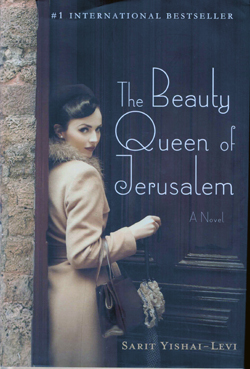The Beauty Queen of Jerusalem by Sarit Yishai-Levi St. Martin’s Press, 2016; ISBN 978-1-250-07816-2; 372 pages; $25.99
By Donald H. Harrison

 SAN DIEGO– The heart rules supreme, or at least it should have, in this novel covering four generations of Ladino-speaking Israelis.
SAN DIEGO– The heart rules supreme, or at least it should have, in this novel covering four generations of Ladino-speaking Israelis.
Next time that you try to forbid a son or a daughter from marrying “out,” however you construe that term, stop and consider what might be the possible consequences. In this novel, whenever a prohibition was honored–whether it was against marrying Ashkenazim or Christians–the results were emotionally crippling, not only to the frustrated child, but also to the wife he settled for, and even for the lovelorn couple’s children who had to grow up in an unhappy home.
While this multiple-layered, well-woven novel never comes out and urges marriage outside of one’s group, it illustrates over and over again that the heart wants what the heart wants.
I can anticipate readers of this review objecting that marrying “out” is tantamount to giving Hitler his victory because it can only result in the decimation of the Jewish people. Although I have heard that argument most of my life, I reject it. Marrying “in” or marrying “out” is less important than marrying “right.” Find yourself a spouse who you love deeply–and who loves you just as deeply–and you are well on your way to establishing a harmonious home. Somehow, somewhere, some members of the Jewish community have developed an inferiority complex in relation to this issue of intermarriage. If a Jew marries a Christian, sooner or later, they believe, the children of such a marriage will decide against being Jews. Well perhaps so, but then again, perhaps not– especially not if the children are raised in a home in which Jewish values, traditions and customs are observed by one or both parents.
Having family members who are intermarried, and plenty of friends who likewise have married “out,” I know that when a parent wraps his or her arms around Judaism, more likely than not their spouses and/ or children will follow. So let’s stop crying “gevalt” and help those intermarried families who are interested in learning more about Judaism to do so.
In Yishai-Levi’s novel, the husbands who had to sacrifice their hearts in favor of custom or tradition ended up feeling cold, even resentful, to the wives they eventually married. The children of these loveless marriages observed the lack of emotional commitment. In the case of a father who showered his love on a physically beautiful daughter but withheld it from his wife, the daughter grew up to be conceited, interested only in herself, with zero intellectual curiosity. She was so spoiled, in other words, that she was stunted.
The experiences of Jews in the Holy Land — first under the Turkish Empire, then under the British Mandate, and finally living in their own country — are well-integrated into the plot. Readers will learn Ladino expressions and gain insight into Ladino culture. All in all, this excellent novel has many lessons to teach.
*
Harrison is editor of San Diego Jewish World. He may be contacted via donald.harrison@sdjewishworld.com. Comments intended for publication in the space below must be accompanied by the letter-writer’s first and last name and by his/her city and state of residence (city and country for those living outside the U.S.)